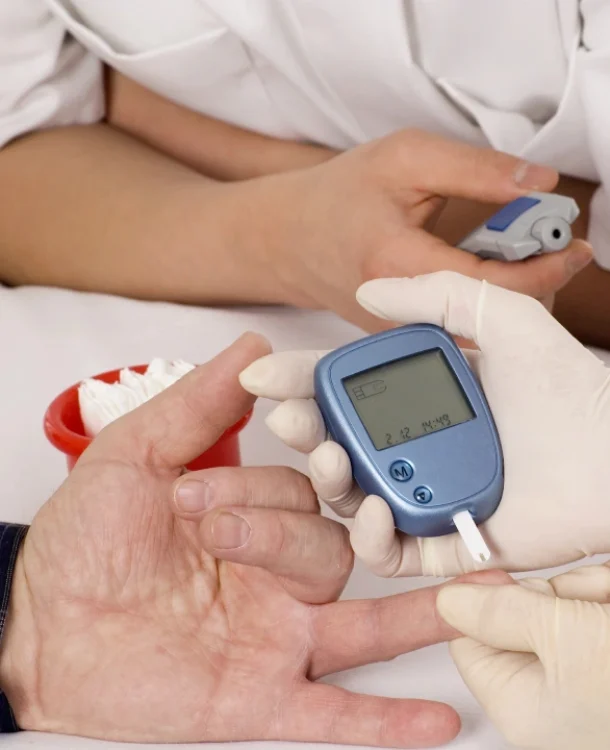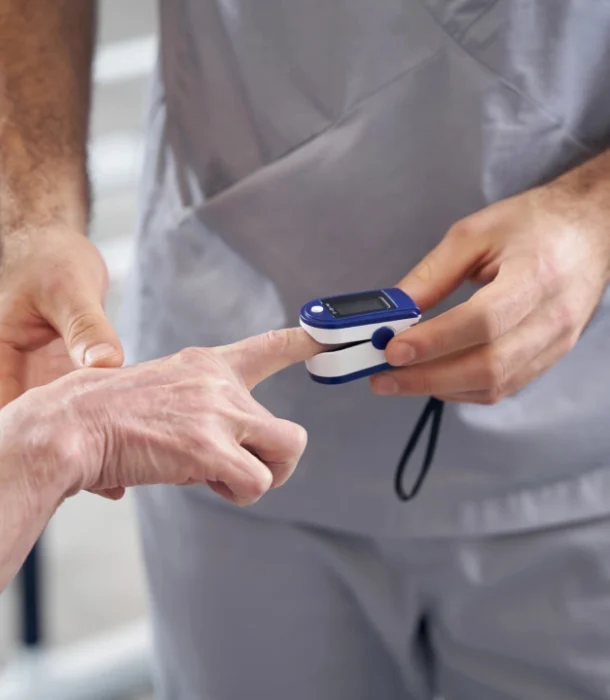Understanding Endocrine Health
- Balancing Hormones, Enhancing Lives
- Your Health, Your Hormones, Our Expertise
- Helping You Take Control of Your Endocrine Health

Understanding Endocrine Health
- Balancing Hormones, Enhancing Lives
- Your Health, Your Hormones, Our Expertise
- Helping You Take Control of Your Endocrine Health

Restore Balance, Regain Energy
Comprehensive Care for Endocrine Health
From blood sugar checks to diabetes management, we offer specialized care for endocrine disorders. Our proactive approach ensures early detection and tailored treatment plans to keep you feeling your best.
Early Detection for Long-Term Wellness
Expert Diabetes Management You Can Trust

Understanding Endocrine Health: The Key to Hormonal Balance and Wellness
The endocrine system is one of the body’s most vital networks, responsible for regulating essential functions like metabolism, growth, mood, and energy levels. It consists of glands such as the thyroid, pancreas, adrenal glands, and pituitary gland, which produce hormones that act as chemical messengers. These hormones help maintain balance within the body, ensuring everything functions properly. When the endocrine system is disrupted, it can lead to significant health concerns that affect daily life.
10 Fascinating Facts About the Endocrine System
1. The Endocrine System Controls Nearly Every Function
The endocrine system regulates metabolism, growth, mood, energy levels, and even sleep patterns through hormone production.
2. It Works with the Nervous System
The endocrine and nervous systems work together to keep the body balanced. While the nervous system sends quick signals, the endocrine system uses hormones for long-lasting effects.
3. Hormones Travel Through the Bloodstream
Unlike nerve signals, hormones are released into the bloodstream and travel throughout the body to reach their target organs.
4. The Pituitary Gland is the “Master Gland”
Located at the base of the brain, the pituitary gland controls many other endocrine glands, including the thyroid, adrenal glands, and reproductive organs.
5. Too Much or Too Little Hormone Can Cause Big Problems
Even a small imbalance in hormone levels can lead to major health issues like diabetes, thyroid disorders, or adrenal fatigue.
6. The Thyroid Regulates Your Metabolism
Your thyroid gland determines how fast or slow your body burns energy, influencing weight, digestion, and temperature regulation.
7. Adrenal Glands Help You Handle Stress
These small glands above your kidneys produce cortisol, the hormone responsible for your body’s “fight or flight” response.
8. The Pancreas Plays a Dual Role
The pancreas functions as both a digestive organ and an endocrine gland, producing insulin to regulate blood sugar levels.
9. Endocrine Health Affects Mood and Emotions
Hormonal imbalances can contribute to anxiety, depression, irritability, and other mood disorders.
10. Hormone Levels Change Throughout Life
From puberty to pregnancy to menopause, hormone production fluctuates at different stages of life, affecting physical and emotional well-being.
The Impact of Hormonal Imbalances on Health
Hormonal imbalances occur when the body produces too much or too little of a specific hormone. These imbalances can lead to a range of issues, including:
- Metabolic Problems – Fluctuations in insulin, thyroid hormones, or cortisol can cause weight gain, fatigue, and difficulty maintaining healthy blood sugar levels.
- Energy and Mood Changes – Hormones play a crucial role in energy regulation. An imbalance may lead to chronic fatigue, depression, or anxiety.
- Sleep Disruptions – Conditions like thyroid disorders or adrenal gland dysfunction can cause insomnia or excessive sleepiness.
- Reproductive Health Concerns – Issues such as Polycystic Ovary Syndrome (PCOS) or low testosterone levels can affect fertility, libido, and overall well-being.


Common Endocrine Disorders and Their Effects
Endocrine disorders can develop at any stage of life, and if left untreated, they may lead to severe complications. Some of the most prevalent conditions include:
- Diabetes – A condition where the body struggles to regulate blood sugar due to insulin resistance or deficiency.
- Thyroid Disorders – Hypothyroidism (underactive thyroid) can cause sluggishness and weight gain, while hyperthyroidism (overactive thyroid) can lead to rapid heartbeat and weight loss.
- Adrenal Insufficiency – A condition where the adrenal glands do not produce enough cortisol, resulting in fatigue, low blood pressure, and muscle weakness.
- Reproductive Health Concerns – Issues like estrogen dominance or low testosterone can impact metabolism, muscle mass, and mood.
Why Early Detection and Management Matter
Many endocrine disorders progress slowly, making it essential to detect them early through routine screenings and blood tests. Left untreated, these conditions can lead to long-term complications such as heart disease, nerve damage, and osteoporosis. Proactive management, including lifestyle changes, medication, and personalized treatment plans, can help individuals maintain optimal health and prevent serious consequences.
At NextGen Walk-in Clinic & Urgent Care, we specialize in diagnosing and managing endocrine issues with a comprehensive and patient-centered approach. Our team of specialists provides:
• Advanced diagnostic testing for accurate assessment of hormone levels.
• Personalized treatment plans to address each individual’s unique needs.
• Holistic lifestyle recommendations to improve overall well-being.
• Ongoing monitoring and support to ensure long-term health.
• We believe that early intervention is key to preventing complications and improving quality of life. Whether you need routine blood sugar checks, thyroid function tests, or expert guidance on managing diabetes, NextGen Walk-in Clinic & Urgent Care is here to help.
Hormones play a crucial role in regulating metabolism, growth, and overall organ function. The endocrine system, made up of glands like the thyroid, pancreas, and adrenal glands, produces these chemical messengers to keep the body balanced. When there’s a disruption—whether due to genetics, lifestyle, or underlying conditions—it can lead to serious health concerns.
Endocrine disorders often develop gradually, making it easy to overlook early symptoms. However, certain signs can indicate an imbalance, including:
• Persistent fatigue or low energy levels.
• Unexplained weight gain or loss.
• Mood swings, anxiety, or depression.
• Excessive thirst and frequent urination.
• Irregular heartbeat or changes in blood pressure.
• Trouble sleeping or body temperature fluctuations.
If you notice these symptoms, it’s important to consult a healthcare provider for further evaluation.
Because hormonal imbalances can develop silently, regular screenings are essential for early detection. Blood tests, hormone level assessments, and metabolic evaluations can help identify potential issues before they progress. Early diagnosis allows for better management, reducing the risk of complications such as diabetes, thyroid disorders, or adrenal insufficiency.
At NextGen Walk-in Clinic & Urgent Care, we specialize in endocrine health by offering comprehensive screenings and personalized treatment plans. By staying proactive, you can take control of your health and ensure your body functions at its best.


Blood Sugar Checks: A Key to Endocrine Health
Maintaining balanced blood sugar levels is essential for overall health, energy production, and the proper function of the endocrine system. Irregular blood sugar levels can be an early warning sign of prediabetes, diabetes, or other hormonal imbalances. Regular monitoring helps detect issues early, allowing for better management and prevention of complications.
Glucose is the body’s primary source of energy, fueling vital organs and muscles. The endocrine system, particularly the pancreas, regulates blood sugar through insulin and other hormones. If glucose levels become too high or too low, it can signal metabolic issues such as diabetes or insulin resistance. Monitoring blood sugar levels helps identify these imbalances, ensuring timely intervention and better long-term health.
Different blood sugar tests provide valuable insights into how the body processes glucose:
• Fasting Blood Sugar Test – Measures glucose levels after an overnight fast, helping assess baseline sugar control.
• Random Blood Sugar Test – Checks glucose levels at any time of the day to identify unexpected spikes or drops.
• A1C Test – Provides an average blood sugar level over 2-3 months, giving a broader picture of long-term glucose management.
• Glucose Tolerance Test – Measures how well the body processes sugar after consuming a glucose-rich drink, often used to diagnose diabetes.
• Continuous Glucose Monitoring (CGM) – Uses a small sensor to track blood sugar levels in real-time, providing continuous insights for better management.
Blood sugar imbalances can be influenced by a variety of factors, including:
• Lifestyle choices – Diet, exercise habits, and sleep patterns play a major role in blood sugar regulation.
• Genetics and family history – A genetic predisposition can increase the risk of diabetes and other metabolic disorders.
• Medications and stress – Certain drugs, illnesses, and chronic stress can impact how the body processes glucose.
• Hormonal imbalances – Conditions like thyroid disorders or adrenal dysfunction can affect blood sugar regulation.
At NextGen Walk-in Clinic & Urgent Care, we prioritize proactive blood sugar monitoring with:
• State-of-the-art diagnostic tools to ensure accurate and timely results.
• Customized testing plans tailored to individual risk factors and health goals.
• Personalized lifestyle guidance to help maintain balanced blood sugar through diet, exercise, and stress management.
Regular blood sugar checks are a simple yet powerful way to take control of your health. Whether you have a family history of diabetes or simply want to stay proactive, NextGen Walk-in Clinic & Urgent Care is here to support your journey toward optimal wellness.
Diabetes Management: A Comprehensive Approach to Better Health
Managing diabetes effectively requires a deep understanding of the condition, proactive lifestyle changes, and the right medical support. At NextGen Walk-in Clinic & Urgent Care, we provide personalized care plans to help individuals maintain optimal blood sugar levels and prevent complications.
Diabetes comes in various forms, each with unique causes and management strategies:
• Type 1 Diabetes – An autoimmune disorder where the immune system attacks insulin-producing cells in the pancreas. It requires lifelong insulin therapy and careful monitoring.
• Type 2 Diabetes – A progressive condition often linked to lifestyle factors like poor diet and lack of exercise. Early intervention can slow its progression.
• Gestational Diabetes – Develops during pregnancy due to hormonal changes, increasing the risk of Type 2 diabetes later in life.
• Prediabetes – A warning stage where blood sugar levels are higher than normal but not yet in the diabetic range. With proper care, Type 2 diabetes can be prevented.
Recognizing the signs of diabetes early is essential for timely intervention. Common symptoms include:
• Constant hunger and fatigue due to the body struggling to use glucose effectively.
• Blurry vision and slow-healing wounds caused by high blood sugar damaging blood vessels.
• Weakened immunity, increasing susceptibility to infections.
Uncontrolled diabetes can lead to severe complications, including kidney disease, nerve damage, and heart problems. Early diagnosis and proactive management can significantly reduce these risks.
At NextGen Walk-in Clinic & Urgent Care, we provide a patient-centered approach, including:
• Comprehensive evaluations – A thorough assessment to understand individual needs.
• Customized treatment plans – A balance of lifestyle changes, medication, and blood sugar monitoring.
• A holistic approach – Integrating diet, exercise, and stress management for optimal health.
Regular blood sugar checks are a simple yet powerful way to take control of your health. Whether you have a family history of diabetes or simply want to stay proactive, NextGen Walk-in Clinic & Urgent Care is here to support your journey toward optimal wellness.


Lifestyle Modifications for Better Diabetes Control
Making sustainable lifestyle changes is key to managing diabetes:
• Follow a low-glycemic diet to prevent sugar spikes.
• Plan balanced meals with lean proteins, healthy fats, and fiber-rich foods.
• Avoid sugary drinks and processed foods, opting for whole, nutrient-dense alternatives.
• Regular movement helps lower blood sugar naturally.
• Safe workout recommendations include walking, strength training, and yoga.
• Achieving and maintaining a healthy weight improves insulin sensitivity.
• Small, consistent changes in diet and activity can make a big difference.
• High stress can cause blood sugar fluctuations. Practice relaxation techniques like meditation.
• Quality sleep is essential for metabolic health. Create a bedtime routine for better rest.
For individuals needing additional support, medical interventions may include:
• Oral Medications – Helps regulate blood sugar by improving insulin function.
• Insulin Therapy – Essential for Type 1 diabetes and some cases of Type 2 diabetes.
• Advanced Treatment Options – Cutting-edge research has introduced new medications and therapies for better diabetes control.
Managing diabetes doesn’t have to be overwhelming. At NextGen Walk-in Clinic & Urgent Care, we offer expert guidance, innovative treatment options, and personalized support to help you achieve a healthier future. Schedule a consultation today and take the first step toward better diabetes management!
Hormonal Balance & Endocrine Health Beyond Diabetes
While diabetes is a well-known endocrine disorder, hormonal imbalances go beyond blood sugar control. The endocrine system regulates various functions, including metabolism, energy levels, and reproductive health. At NextGen Walk-in Clinic & Urgent Care, we provide specialized care for a range of endocrine conditions, helping patients restore balance and improve overall well-being.
The thyroid gland plays a crucial role in metabolism, energy regulation, and mood stability. When it malfunctions, it can lead to serious health concerns.
• Hypothyroidism – Occurs when the thyroid produces too little hormone, slowing metabolism. Symptoms include fatigue, weight gain, dry skin, and depression.
• Hyperthyroidism – Results from excessive thyroid hormone production, leading to rapid metabolism. Symptoms include weight loss, anxiety, irregular heartbeat, and excessive sweating.
Treatment options vary depending on the condition but may include thyroid medication, dietary adjustments, and, in some cases, medical interventions such as radioactive iodine therapy or surgery.
The adrenal glands produce hormones that regulate stress, metabolism, and immune function. When these glands are imbalanced, they can lead to significant health issues.
• Cortisol Imbalance – Chronic stress can cause overproduction of cortisol, leading to weight gain, high blood pressure, and fatigue.
• Adrenal Insufficiency (Addison’s Disease) – A condition where the body doesn’t produce enough cortisol and aldosterone, causing extreme fatigue, muscle weakness, and low blood pressure.
• Cushing’s Syndrome – Results from excess cortisol, often due to long-term steroid use or adrenal tumors, leading to weight gain, fragile skin, and high blood sugar.
Managing adrenal disorders involves lifestyle changes, medication, and stress reduction techniques to support hormonal balance.
PCOS is a common hormonal disorder affecting individuals of reproductive age, often linked to insulin resistance and metabolic health.
• Hormonal Imbalances – PCOS leads to elevated androgens (male hormones), causing irregular periods, acne, and excessive hair growth.
• Connection to Diabetes – Many individuals with PCOS develop insulin resistance, increasing the risk of Type 2 diabetes.
• Management Strategies – Lifestyle modifications, including a balanced diet, regular exercise, and medications like metformin, can help regulate hormones and improve insulin sensitivity.
If you're experiencing symptoms of thyroid issues, adrenal disorders, or PCOS, NextGen Walk-in Clinic & Urgent Care offers expert evaluations and customized treatment plans to restore hormonal health. Schedule a consultation today and take control of your endocrine well-being!


Why Choose NextGen Walk-in Clinic & Urgent Care for Endocrine Health?
At NextGen Walk-in Clinic & Urgent Care, we go beyond symptom management—we focus on identifying the root causes of endocrine disorders and creating personalized treatment plans that support long-term health. Our approach combines cutting-edge medical advancements with holistic lifestyle interventions, ensuring that our patients receive the most comprehensive care possible.
Our team consists of highly skilled specialists dedicated to diagnosing and treating a wide range of hormone-related conditions. With years of experience in endocrinology, we provide:
• State-of-the-art diagnostic tools for early and accurate detection.
• Expertise in managing complex endocrine disorders, including diabetes, thyroid disease, adrenal imbalances, and PCOS.
• A patient-centered approach that prioritizes individualized treatment and long-term wellness.
At NextGen Walk-in Clinic & Urgent Care, we don’t just treat endocrine disorders—we aim to prevent them. Our holistic approach ensures that patients receive comprehensive care that supports their overall health and well-being.
• Integrating lifestyle-based interventions with modern medicine to promote optimal hormone function.
• Preventative screenings and early interventions to detect imbalances before they become serious.
• Long-term management strategies that help patients maintain stability and prevent complications.
We believe that every patient’s endocrine health journey is unique, which is why we offer customized treatment plans tailored to individual needs.
• Comprehensive lab testing to assess hormone levels, metabolic function, and related health markers.
• Continuous monitoring to track progress and make adjustments as needed.
• Patient education and support to empower individuals with knowledge about their condition and treatment options.
Here’s What our Patients Say About Us

James G.
I had been struggling with fatigue, weight gain, and mood swings for years. After visiting NextGen Walk-in Clinic & Urgent Care, they quickly identified my thyroid imbalance and started me on a treatment plan. Within weeks, I felt more energized and like myself again. Their team is knowledgeable, compassionate, and truly cares about their patients. Highly recommend!

Brian J.
For a long time, I suspected something was off with my hormones, but no doctor took my concerns seriously. NextGen Walk-in Clinic & Urgent Care listened to me, ran the right tests, and helped me get my blood sugar levels under control. I feel healthier and more confident than ever. Thank you!

Guillermina G.
NextGen Walk-in Clinic & Urgent Care is top-notch! The staff is professional, and they take the time to explain everything in detail. My diabetes management has improved tremendously since I started treatment here. Their proactive approach makes all the difference!
FAQs About Endocrine Health and Hormonal Balance
The endocrine system regulates metabolism, growth, mood, energy levels, and many other body functions through hormone production.
Common signs include fatigue, weight changes, mood swings, sleep disturbances, and changes in appetite or libido.
Symptoms of thyroid disorders include weight gain or loss, hair thinning, dry skin, fatigue, and changes in heart rate. A blood test can confirm any issues.
Yes, chronic stress can lead to imbalances in cortisol, the stress hormone, which may contribute to fatigue, anxiety, and weight gain.
Diabetes is an endocrine disorder where the body either doesn’t produce enough insulin or can’t use it properly, leading to high blood sugar levels.
Maintaining a healthy diet, managing stress, exercising regularly, and getting enough sleep can help keep hormones in balance.
The most common include diabetes, thyroid disorders (hypothyroidism and hyperthyroidism), adrenal gland disorders, and polycystic ovary syndrome (PCOS).
It depends on your symptoms and medical history. If you experience signs of hormonal imbalance, your doctor may recommend blood tests.
Yes, eating a nutrient-rich diet, reducing processed sugars, staying active, and managing stress can improve hormone function.
If you experience persistent fatigue, unexplained weight changes, irregular periods, or other signs of hormonal imbalance, schedule a consultation with an endocrinologist.
Take Control of Your Health – Schedule a Consultation Today!
Your endocrine health is essential for maintaining energy, metabolism, and overall well-being. If you’re experiencing symptoms like fatigue, weight fluctuations, or mood changes, it’s time to take action. At NextGen Walk-in Clinic & Urgent Care, our expert team specializes in comprehensive endocrine health management, from diabetes care and blood sugar monitoring to thyroid and hormone balance treatments.
Prioritize Your Health Today
Ignoring hormonal imbalances can lead to long-term complications, but early detection and personalized care can help you regain control. Our cutting-edge diagnostics, customized treatment plans, and holistic approach ensure you get the care you deserve.
Schedule Your Appointment Now
Visit Us: 6306 Gulfton St., Houston, TX 77081
Call Us: 281-888-7981
Email Us: info@nextgencares.com
Take the first step toward better health with NextGen Walk-in Clinic & Urgent Care.
Book your consultation today and start your journey to a healthier, more balanced life!

